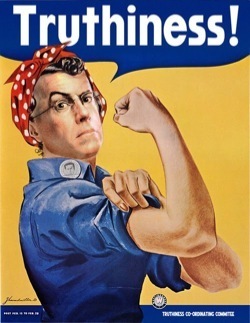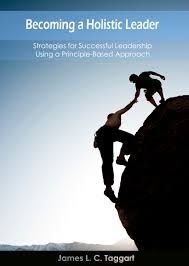Beyond Truthiness: Does Leadership with Integrity Have a Hope?

Americans—indeed people in general in any country who follow politics—live in the moment. It’s easy to forget the transgressions of even recent political leaders who got caught in scandals, or who proved impotent at getting key legislative bills passed, or engaging the hearts and minds of citizens. It’s all about the current person in office.
Donald Trump has been getting a real shit-kicking since being sworn into office—not that he hasn’t deserved much criticism. The issue is anything he does or tries to initiate is criticized. It’s become a sort of Pavlovian reflex with most of the mainstream media and pundits. Trump opens his mouth or tries to initiate something (eg, recent communiques with North Korea) and the media and late-night hosts jump on him, flapping around like trained seals.
Your faithful correspondent recently read an excellent book: Republic of Spin: An Inside History of the American Presidency by David Greenberg. He starts with President McKinley, examining every president up to Barack Obama. Too bad it was published just prior to Trump’s election as President.
This is a revealing look at how political messaging and the manipulation of the press and the public evolved over more than a century. Indeed, many of the tactics and methods date back many decades.
In Greenberg’s penultimate chapter, covering George W. Bush’s two-term presidency, he starts off with comedian Stephen Colbert’s contrived conservative character on the Colbert Report, introduced in 2005 on Comedy Central. Check out Greenberg’s succinct description of what Colbert’s “truthiness” meant:
“…Colbert praised Bush’s oft-stated proclivity for making instinctive decisions without regard for countervailing facts. It was important… for something to feel true than for it to be true. ‘Truthiness’ was the quality of feeling true in the gut.”

However, placing Colbert’s obvious political leanings in context (as witnessed by his frequent no-holds barred diatribes against Trump on his current Late Show show), where does that situate Americans in a real-world political spectrum covering decades?
Let’s revisit President Lyndon Johnson (a Democrat) who, while ushering in civil rights legislation in 1964, has a dark cloud over his legacy when it comes to one of America’s darkest chapters: the Vietnam War.
If the “Deep State” (as right-wing conservatives like to currently invoke) has ever existed in the history of the United States, this was perhaps a pivotal moment. Johnson (aided and abetted by his key Cabinet members and senior aides, including General William Westmorland) deliberately lied to the American public about the war. Here’s David Greenberg:
“By the summer of 1967, Johnson’s support was falling and anti-war activism was spreading. More than 450,000 soldiers were now in Indochina, 100 of them dying each week. According to a Gallup poll, nearly 70 percent of Americans thought the administration had deceived the public about the war.”
For any young folks reading this post, some 58,000 U.S. soldiers lost their lives during the Vietnam War. Tens of thousands were physically and mentally injured. And then there were the Vietnamese: upwards of 250,000 South Vietnamese soldiers died and an estimated 2 million civilians on both sides lost their lives.
The Iraq War, in contrast saw 4,400 American soldiers killed.

How do we define an elastic concept, one that has at its core a comedic creation?
In a period when the public is not just being overwhelmed with news and information directed at them from all sides and means, the bigger issue seems to be a numbness that’s creeping in. Whether it’s school shootings in the U.S. or Donald Trump’s latest policy reversals—not to overlook international geo-political-economic events—people are just getting numb to the onslaught of information, consisting increasingly of manipulated and fake news often generated by trolls and bots.
Does integrity in leadership no longer matter when it comes to communicating?
Does anyone care?
A lie can travel half way around the world while the truth is putting on its shoes.
—Charles Spurgeon
___________________________________________________________________________________________________

Visit Jim’s e-Books, Resources and Services pages.
""""
Articles from Jim Taggart
View blog
Many years ago, I watched Eco-Challenge 2000 on the Discovery Channel (a show that ran from 1995 to ...

Franklin Delano Roosevelt rates as being one of America’s greatest presidents, probably in the top t ...

In my last post we looked at The Five Levels of Teams: Where Are You on the Team Performance Curve? ...
You may be interested in these jobs
-
marketing specialist
Found in: Talent CA 2 C2 - 6 days ago
Ye's Wok Restaurant Paradise, CanadaEducation: · Expérience: · Education · Secondary (high) school graduation certificate · Tasks · Plan development projects · Develop social and economic profiles of an area to encourage industrial and commercial investment · Conduct comparative research on marketing strategies f ...
-
retail store supervisor
Found in: Talent CA 2 C2 - 2 days ago
Erin Esso Erin, CanadaEducation: · Expérience: · Education · Secondary (high) school graduation certificate · Tasks · Assign sales workers to duties · Hire and train or arrange for training of staff · Authorize payments by cheque · Order merchandise · Authorize return of merchandise · Establish work ...
-
Manager of Operations
Found in: beBee S2 CA - 3 weeks ago
InsideHigherEd Barrie, Canada OTHERManager of Operations & Project Management, OVPRI · Date Posted: 03/19/2024 · Req ID: 36592 · Faculty/Division: UofT Scarborough · Department: UTSC: Office of Vice-Principal Research & Innovation · Campus: University of Toronto Scarborough (UTSC) · Description: · About Us: The Un ...



Comments